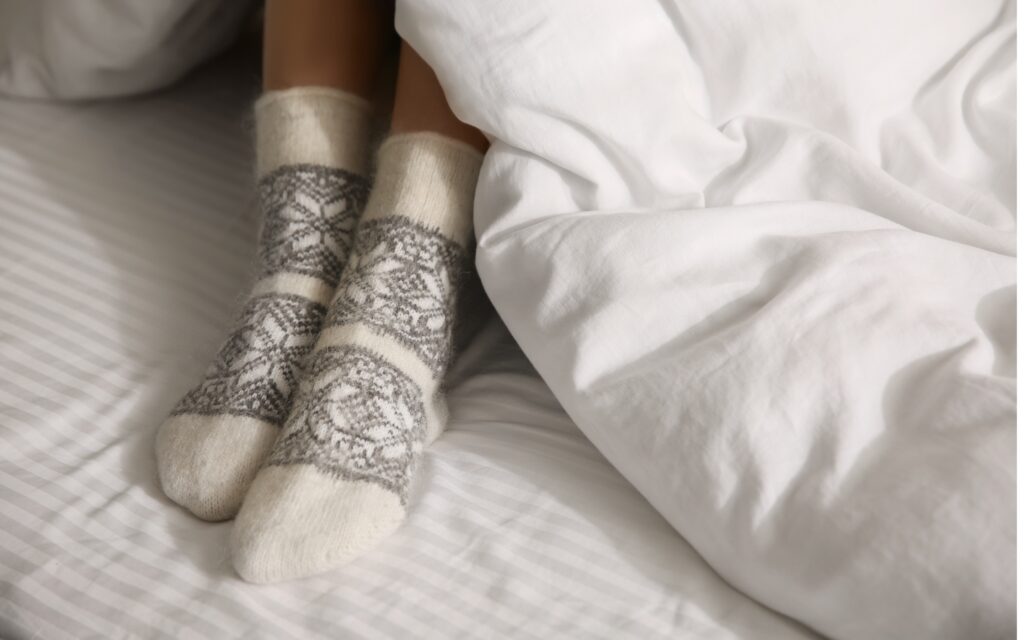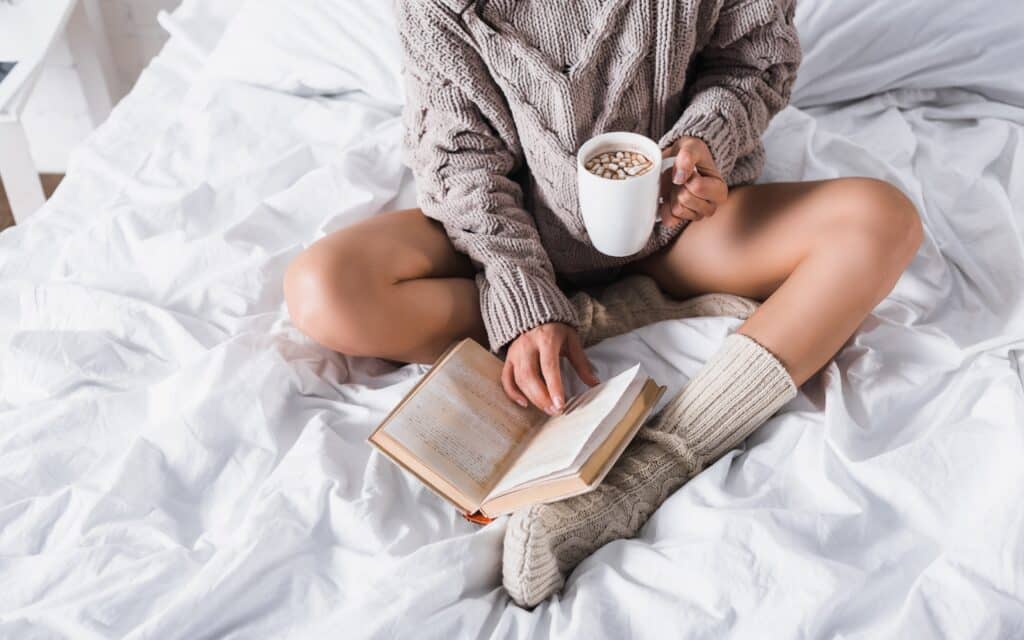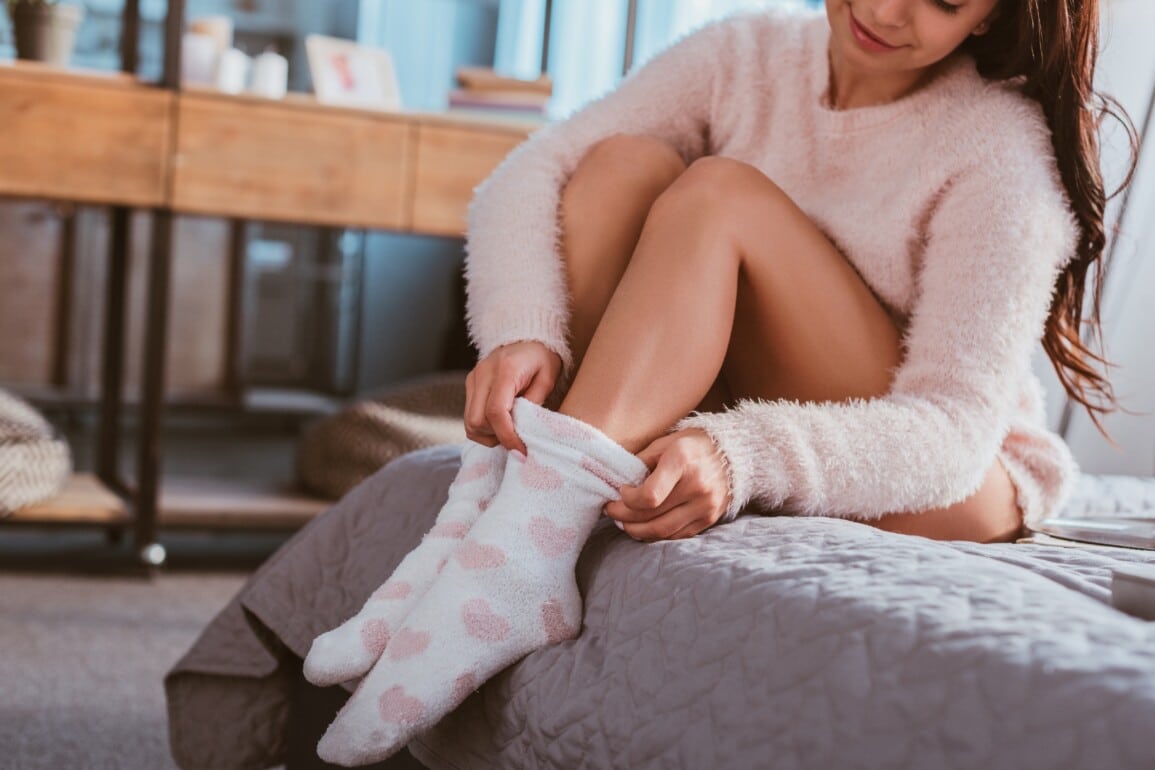Bed socks could be the cure to your insomnia. Wearing socks to bed is slumber inducing.
As unusual as it might seem to wear socks to bed every night, many people believe bed socks really are the key to a better night’s sleep.
Why? Because your sleep quality relies heavily on your ability to properly regulate your temperature.
For years, people have argued about the pros and cons of wearing socks to bed.
Some people feel as though they can’t sleep unless they have their feet hanging out from under the covers. Others believe sleeping socks are responsible for the best slumber they ever had.
So, what’s the reality?
Today we’re going to look at the benefits of wearing socks to bed, and what kind of socks you may want to consider.
Is wearing socks in bed good for sleep?
Wearing socks to bed could scientifically improve your sleep pattern.
According to one study in 2007, people wearing normal or heated socks in bed were able to fall asleep faster, because they had better temperature regulation.
Research from the National Sleep Foundation supports this idea, revealing warming your feet before bed can help tell your brain it’s time to snooze – particularly as part of an evening routine.
The reason so many people consider sleeping with socks on, is we often feel more comfortable and relaxed when we’re warm.
Wearing a pair of socks helps to regulate the temperature throughout your entire body, so you’re less likely to be kept awake by discomfort.
Wearing socks to bed also has other major benefits, such as:
- Preventing hot flashes: Many women experiencing menopause go through hot flushes, which can include palpitations, sweating, and sudden warmth. Socks can help to lower body temperature by reducing the demand on the circulatory system to keep pumping warmth to the extremities. Socks make you cooler, by making you warmer.
- Reduced risks with Raynaud’s disease: People suffering from Raynaud’s disease can experience issues with blood flow in their hands and feet, causing fingers and toes to feel numb. A pair of socks will chase away those feelings of coldness caused by poor circulation.
- Improved sex: This one is still under investigation, but the BBC revealed wearing socks improved the ability of people to achieve orgasm by around 30%. You may also find you have a better time if you’re not constantly worrying about cold feet.

What are the best bed socks?
So, we know bed socks can have a positive impact on your sleeping (and other bed activities), but not just any pair will do.
Bed socks need to be designed specifically to suit your sleeping habits. Like a good pair of PJs, the best socks for sleeping will keep your feet warm, stay cozy during the night, and help to regulate your body temperature.
Usually, the efficacy of a pair of bed socks depends heavily on the kind of material you choose.
Some people assume compression socks are the best option, because they can help with improving circulation.
However, doctors will not recommend using compression socks as bed socks, because your blood moves more slowly when you’re lying down.
Instead, the best socks for sleeping need to be the ones that are:
- Well fitting: You don’t want your socks to roll down, bunch up, or fall off during the night, because this is more likely to wake you up. Choose a pair of cotton bed socks or fluffy bed socks that hug your feet without being uncomfortable.
- Warm: The best bed socks are warm without making you sweaty. Try to avoid any insulating socks unless you know you’re going to be sleeping in a cold place. Instead, stick to naturally warm materials like wool bed socks, which help to wick away sweat while regulating your temperature naturally.
- Made with the right material: If you can choose any pair of bed socks, the best pair will often be either cashmere bed socks, or merino wool bed socks. These can cost more than your standard socks, but they’re fantastic for properly warming your feet without causing too much itching, sweating, and other problems.
4 great pairs of bed socks to try
The best socks for sleeping will be something you discover for yourself. Different people have their own unique preferences, and we all respond to materials in unique ways.
For the most part, cashmere bed socks are the most popular, but you can also find a range of alternative options which work wonderfully too. For instance:
Fluffy bed socks:
Try a pair of super soft microfiber crew socks that won’t cover too much of your calf. These cosy socks will make you feel like you’re walking on clouds. The microfiber sock is a good choice if you want to avoid sweating too much during the night.
Nonslip bed socks:
A pair of lounge bed socks with non-slip coating on the bottom are perfect if you’re planning a hospital visit, or you’re walking on non-carpeted floors. These thermal non-slip socks have an excellent grip. It’s a good idea to have a pair on-hand to replace your slippers.
Cotton bed socks:
For those who prefer to keep it simple with cotton, these knee-high bed socks are extra long and wonderful for cold nights. You can get your cotton bed socks in a range of colors to suit your PJs too. Cotton is generally a good choice of material for most people because it’s well-tolerated.
Cashmere bed socks:
If you’re looking for the best sleeping experience, there’s nothing quite like a pair of cashmere bed socks. These pure Scottish blend cashmere socks are a delight to wear- you may never want to take them off. Just expect to spend a little more on something this luxurious.
Don’t be afraid to experiment with a few different styles and materials in your bed socks to find the ones that work best for you.

What if you hate wearing socks in bed?
Although wearing socks to bed might be good for you, it’s not going to appeal to everyone. Some people simply won’t be able to relax when they’re wearing bed socks.
If that’s the case for you, and you’re struggling to get to sleep thanks to cold feet, there are other ways you can warm yourself up.
Warm foot baths before bed are a proven solution for relieving feelings of insomnia, and fatigue after sleep. Taking a hot bath or just soaking your feet could be a great way to upgrade your evening routine and banish unwanted insomnia.
You could also look into giving your feet a pre-bed massage. Adding a natural circulatory boosting substance into the mix like massage oil or your favorite moisturizer will help to encourage blood flow towards your feet.
You could even look into wearing socks all the way up to the point when you’re about to go to bed, then take them off when your feet are warm.
Keep in mind that wearing socks in bed may also be problematic for certain people. If you have issues with overheating, then you should speak to your doctor before you start changing your sleeping routine.
It’s also best to avoid encouraging children to keep their socks on when they go to bed. Children and infants are less able to control their temperature, which increases their risk of overheating.
Consider giving your kids a hot water bottle to sleep with or running them a hot bath before they sleep if they have cold feet.
Discovering the benefits of sleeping socks
Sleeping socks are a fantastic way to improve your sleep quality and encourage a better night of rest if you usually have trouble with bad circulation.
If you find you’re often kept awake by cold feet, or you struggle with your circulation throughout the day, wearing socks can help to keep your temperature at the right level.
Remember, stick to breathable socks which are naturally moisture resistant, so you don’t end up getting too sweaty. If you start to feel warm or overheated during the night, you’re free to take your socks off whenever you like.
If you hate the idea of wearing socks all together, then you can try a range of different options to warm up your feet, from pre-bed massages, to heated pillows and warm blankets.
Siestio. Sleep Matters.
General advice disclaimer
This article contains general tips and advice. However, no diet or exercise program should be started without consulting your physician or other industry professional first. For more information read our full disclaimer here.







